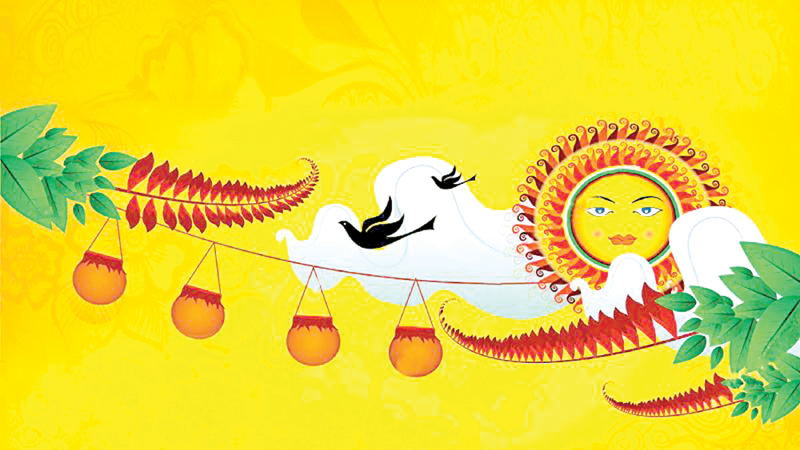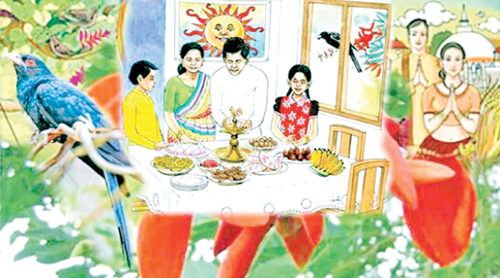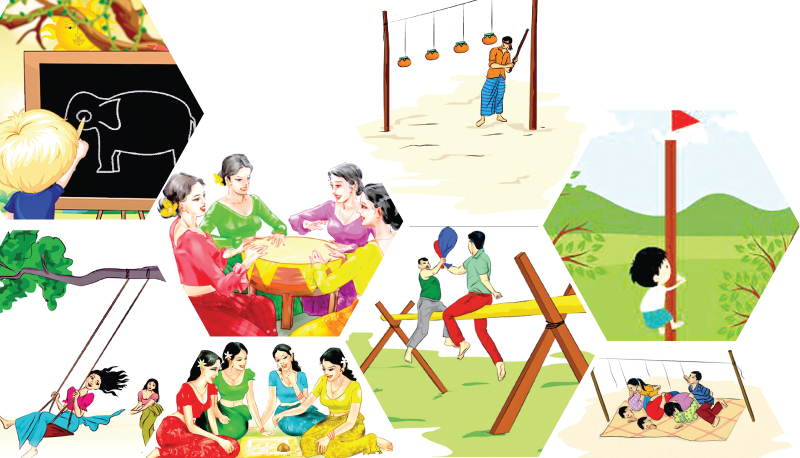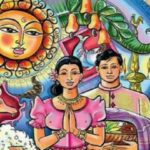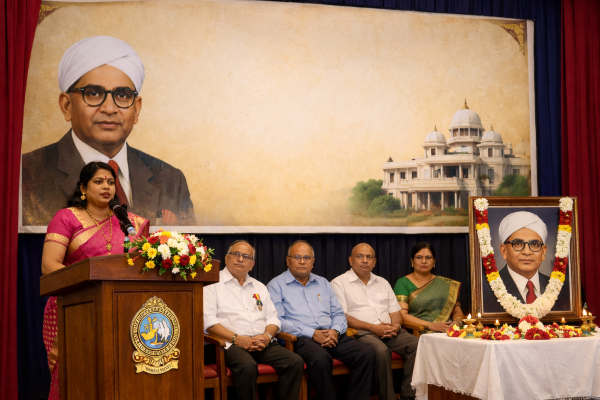Avurudu: A time of transformation-By Pramod de Silva
Source:Sundayobserver
The Sinhala and Tamil New Year is all about transition. Astrologically, the reason is the transit of the Sun from Pisces (Meena) to Aries (Mesha). Traditionally, it marks the season where farmers and others pay homage to the Sun for a bountiful harvest, which gives them new hopes. In other words, a period of transition in their lives, a sort of renewal and transformation.
The roots of the traditional New Year go back thousands of years. In fact, Oriental cultures have based their calendars – and daily life – around the movements of the Sun and the Moon for millennia. The festival is based on the fact that the Sun gives us life. Our food is literally made by the Sun through the process of photosynthesis, which is really the basis of all life on Earth. Thus the New Year traditions evolved as a result of farmers expressing their gratitude to the Sun and Nature for a bountiful harvest, paving the way for a transformation in their lives.
In fact, the very word “Sankranthi” (transition) derived from Sanskrit says it all. Variations on this theme can be found in virtually all Asian countries. For example, in Thailand the traditional New Year period is known as “Songkran”, derived from Sanskrit.
Life begins anew
It is easy to see why the traditional New Year is thought of as a rejuvenation of one’s soul. Avurudu, as the Sinhala and Tamil New Year is often called in Sri Lanka, is an occasion to forget the past and forgive one’s adversaries. After all, life is too short to hold onto grudges. In coming to terms with the past and reconciling with any person or persons with whom you had some sort of disagreement, you become a new person. Life thus begins anew at Avurudu. Significantly, the Sinhalese word “Bak” for the month of April signifies “fortune”, being a derivative of the Sanskrit root word Bhagya, which also is a common name in many Asian countries.
A lot of people view the auspicious times associated with the Avurudu with disdain in this high-tech age, but they teach us the value of time and punctuality. They also emphasise the importance of familial links. When practically everyone kindles the flames of the hearth at the same time, that sets the tone for working on time for the rest of the year. The auspicious time for “Ganu-Denu” or transactions is another opportunity to renew our bonds within the family and even outside of it. Many banks give their customers an opportunity to engage in banking transactions at this exact time, bringing a touch of prosperity to their lives. Incidentally, the word “Ganu Denu” loosely translates to “Give and Take”, which is an appropriate lesson for our lives. This points to the need for a bit of compromise in everything we do.
Significance
Avurudu reminds us of the importance of respecting our elders. Hence the practice of worshipping parents and elderly relatives when the New Year dawns. But there is another higher purpose – giving someone a sheaf of betel leaves means that you have forgotten or forgiven any enmity, misunderstanding or anger that may have caused a rift in the year gone by. Thus Avurudu is a season for Giving – as well as for Forgiving. It is a time where everyone in the family and the neighbourhood gets together in a spirit of harmony and peaceful co-existence.
Another important part of Ganu Denu is commencing some sort of work for the first time in the New Year. Called Weda Alleema in Sinhala and Er Mangalam according to Hindu traditions, this calls for starting some work that would bring prosperity to oneself and the family throughout the year. For example, a student can study a lesson and a farmer can work on his field.
The somewhat related auspicious time for leaving for work is often overlooked, but it also teaches us the importance of respecting the work or job that we do. This also marks a new beginning in our working lives, at a time when there is a raging debate on work-life balance. We need both in our lives, but if we are happy about our job, life at home and in the wider society will automatically be much better. Most people neglect this aspect, leading to unnecessary misery in their lives. A fresh beginning in our job, regardless of whether you are the employer or an employee, will brighten the whole year.
Avurudu is also about ensuring the bonds that bring us together in society – and what better way than traditional games to do it? From pillow fighting to cross country running, Avurudu games bring the entire village together for a day filled with fun and laughter. There are no winners and losers in these games – everyone wins in the end, as the villagers and townsfolk get together in a spirit of camaraderie. This is a great time especially for the children, who can get away from studies and in today’s context, various screens and devices, for a day of fun outdoors.
Need to reinforce the bonds
The authorities must also make an effort to document and preserve some of the more traditional games such as olinda keliya, eluvan keliya, mevara sellama, buhu keliya, muthu keliya and mee sellama. Of course, these events are open to all, regardless of communal or religious differences. This is significant at a time when there is a dire need to reinforce the bonds among different communities and religious groups.
In a nutshell, this is what Avurudu is all about. It brings us all together – young and old. Better still, it showcases the harmony that exists among different communities in Sri Lanka, as everyone in the village joins in the Avurudu frolic, regardless of community and religion. Avurudu has transcended such man-made boundaries and become a national festival celebrated by all Sri Lankans wherever they live, in Sri Lanka or overseas. That is what Sri Lanka should be – a country where all people live in harmony and take pride in each other’s cultural norms and traditions. In fact, Muslims celebrate Eid-Ul-Fitr just the day before Sinhala and Tamil New Year, highlighting our unique multi-cultural, multi-ethnic identity.
No Avurudu table can be complete without the obligatory Kiribath (Milk Rice), which is the first item cooked to mark the dawn of the year. The overflowing of milk in this instance symbolises happiness and prosperity for the entire family and even the country. In many Hindu households, a sweet rice is made with new raw red rice, jaggery, cashew nuts, ghee and plums.
The Avurudu table brings everyone together. This is very important in a society where the tradition of family sit-down meals has disappeared for all intents and purposes. Today’s pressures to relentlessly pursue money and differing interests/work hours of family members mean that no one has the time to enjoy a sit-down meal over free-flowing conversation and plenty of laughter.
At best, the whole family might have eyes glued to the television while having dinner with no conversation at all. Family bonds have taken a severe beating due to modern lifestyles but Avurudu reminds us that we can – and should – do better to keep families together. But Avurudu cannot be confined to one’s home or village. Avurudu gives us an opportunity to visit far-flung friends and relatives at least once a year with plenty of gifts and sweetmeats in hand.
There is a massive rush to go to villages, with buses and trains filled to capacity. This is also one of the few chances for those based in the cities to go back to their villages for a few days to get in touch with their roots, so to speak.
Avurudu also has a spiritual or religious element, though the commercial elements may sometimes overshadow it. The Punya Kaalaya (literally a time for meritorious deeds) or Nonagathaya (literally a period with no auspicious times) is designed to let us visit the Vihara or the Kovil to purify our souls. This is indeed a lacuna that we need to fill, as we have moved away from religion in a highly commercialised world.
Avurudu is sometimes likened to a person, through the reference to an Avurudu Kumaraya (New Year Prince). He is supposed to be a radiant individual who brings prosperity to the whole village and the whole country.
Avurudu is a time for a fresh start in every sphere of our lives.
Avurudu marks a deviation from the old routine and signals that we are ready to take on new challenges in the coming year. Avurudu gives us fresh hope for a successful, bountiful year ahead.
It is also a time for committing ourselves to new resolutions to become better persons in every possible way.



